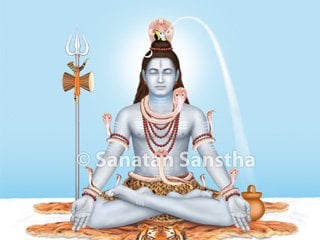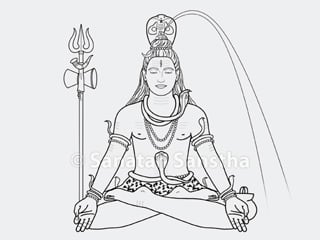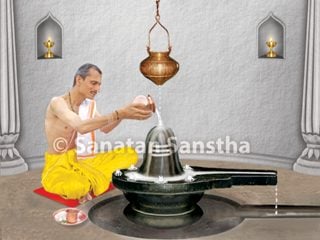
Shiva
One of the most important attributes of a good devotee is to have constant spiritual curiosity about the Deity he wishes to worship. Related information will help the devotee gradually enhance faith in the Deity, and intensify spiritual practice. Often, devotees rely on wrong sources of information, such as TV series, films or even novels on Deities.
Origin and meaning
1. The word Shiva ( शिव) has been derived by reversing the letters of the word vash (वश). Vash means to enlighten; hence, the one who enlightens is Shiva. Shiva is Absolute, self-radiant. He remains radiant and illuminates the universe.
2. Shiva is an auspicious and prosperity-bestowing Principle.
3. Shiva means Brahman and Paramshiva means Supreme Brahman.
Spiritual meaning of some other Names
1. Shankar
In शं करोति इति शङ्कर: | Sham (शम) means benefaction and karoti ( करोति) means bestows. Thus, the one who bestows benevolence is Shankar.
2. Mahankaleshwar
The Kshetrapaldev (Guardian Deity of aterritory) of the entire universe is Kalpurush, meaning Mahakal (or Mahankal).
3. Mahadev
At the root of the thought of Creation and functioning of the universe, there are three basic thoughts, namely Absolute purity, Absolute knowledge and Absolute spiritual practice. The Devata (Deity) who possesses all these three is known as Mahadev (The superior-most Deity) meaning, the God of Gods.
4. Bhalchandra
Bhal (भाल) means the forehead. The one who adorns the chandra (Moon) on His forehead is Bhalchandra. Ganapati, the son of Shiva, also has Bhalchandra as one of His names.
5. Gangadhar
River Ganga was originally in heaven. She descended onto the earth as a result of the intense austerities performed by King Bhagiratha. None had the ability to restrict Her flow then. Shankar adorned Her in the knotted hair on His head; hence, He is also known as Gangadhar.
6. Karpuragaur
Shiva’s complexion is white, akin to that of karpur (Camphor). Hence, the name Karpuragaur.
7. Stenpati
Sten (स्तेन) is a thief. Stenpati ( स्तेनपती) means the guardian of thieves. In earlier times, Shiva’s temples were mostly located on the outskirts of villages. They were the hideouts of thieves. It was here that thieves shared the stolen booty and even left a share for Shiva !
8. Pingalaksha
The words pingal ( पिंगल) and aksha (अक्ष) make up the word Pingalaksha (पिंगलाक्ष). The bird named pingal or pingala is a type of owl that is able to perceive the past, present and the future; aksha means eye. Since Shiva has the same ability, He is referred to as pingalaksha.
9. Aghor
Aghor means one who never worries. Shiva resides in a smashan (Crematorium), dwells in the company of ghosts, wears a snake around His neck, drinks venom, and yet has no worries at all. (Shrivishṇu resides in the Vishṇulok and reclines on the serpent Shesha. Likewise, Shiva resides on the mountain Kailas or in a smashan. When on Kailas, He mediates and when in a smashan, He is in an active state.)
10. Neelkanth
The poison generated during the churning of the celestial ocean (the process is also known as samudra-manthan) was burning the entire world, but no Deity came forward to the rescue. At that time, Shiva drank the poison and saved the world from complete destruction. Ingestion of the poison turned His throat blue and He came to be known as Neelkanth.
11. Deenabandhu, Deenanath and Bhola
In a few of His devotional songs, H.H. Bhaktaraj Maharaj (Seat of faith of Sanatan Sanstha) has addressed the Guru, using terms like Deenabandhu, Deenanath and Bhola. Whilst singing these devotional songs of H.H. Bhaktaraj Maharaj, a lady-seeker of Sanatan had the following spiritual experience, which clarifies the meaning of these terms in relation to Shiva. “I felt as if I am addressing Shiva through the words Deenabandhu, Deenanath and Bhola, which appear in the devotional song. The nurturer of all beings in this universe is termed Deenanath; whereas, the soul in the natural, ego-less state is addressed as Bhola. Deenabandhu is the one who provides support just as a friend does and by keeping His hand on the head, bestows his continual grace. I realised why I felt like applying this terminology penned by H.H. Bhaktaraj Maharaj, when He was in the Shivdasha [The state of being one with Shiv (God) Principle], to the Shivatattva in the sanctorum”. – Mrs. Anjali Mukul Gadgil, Sanatan Ashram, Ramnathi, Goa.

 Unique Spiritual experiences of Miss Smital Bhujle after chanting Om Namah Shivay
Unique Spiritual experiences of Miss Smital Bhujle after chanting Om Namah Shivay How to celebrate Mahashivaratri during adverse times?
How to celebrate Mahashivaratri during adverse times? Spiritual science underlying the ritual of offering a bel (aegle marmelos) leaf to Deity Shiva
Spiritual science underlying the ritual of offering a bel (aegle marmelos) leaf to Deity Shiva Spiritual characteristics of Deity Shiva
Spiritual characteristics of Deity Shiva What is the significance of consecrating the Shivapindi with milk on Mahashivratri?
What is the significance of consecrating the Shivapindi with milk on Mahashivratri? How to take darshan of Shiv pindi ?
How to take darshan of Shiv pindi ?